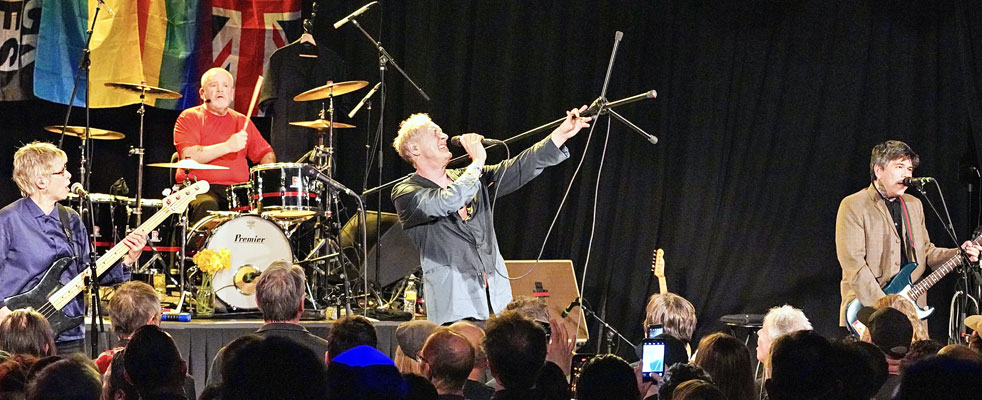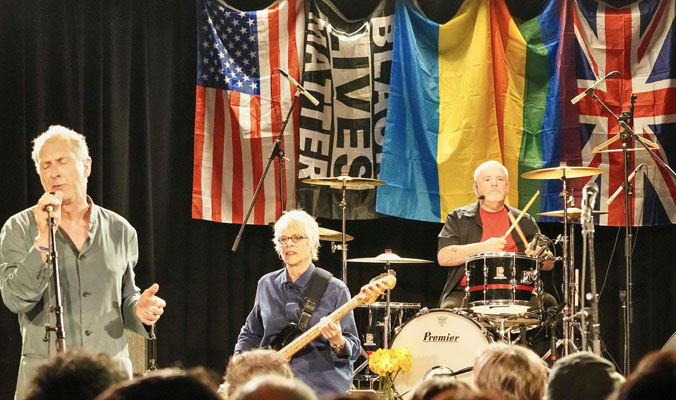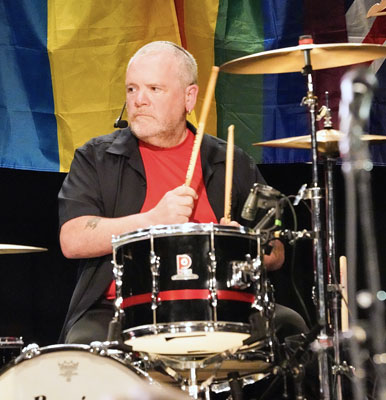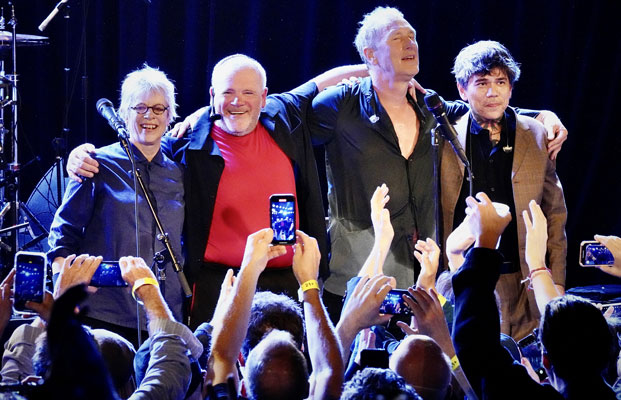GANG OF FOUR

March 2022 tour photos by Tony Smith
Still relevant, still funky, still influential
Interview by Robin Cook
(June 2022)
21st-century Texas might appear to be removed from 1970's Leeds where Gang of Four began. Still, their biting, socially charged, funk-inspired post-punk is scarily relevant in a world confronting fascism and a pandemic. The band hit the road in 2022, with original members Jon King (vocals) and Hugo Burnham (drums), bassist Sara Lee (who joined in the early 1980s), and guitarist David Pajo replacing Andy Gill, who died in 2020. PSF joined King and Burnham for an interview on the band's tour bus before an Austin show.
PSF: Give me some background on the reunion and how it came about.
KING: Around three years ago, we had collectively come to look forward to leaving the Warner Brothers contract, which was in perpetuity and do something else as a result of this change in this American law called the '35-year rule.' And so we were able to leave Warner Brothers and get a better deal, which we did. We signed with Matador Records. And part of that was the rationale really, for leaving Warner Brothers, one, was we weren't being very well remunerated because we'd signed the deal in the day of physical media. But secondly, they weren't interested in what we did. So given that we had a new, wonderful record label who were actually interested in what we did, we then thought, "well, could it be to reissue the vinyl versions of the thing and then tell the story of the band as much as we could." So that's when I started working on the box set and the design of the box.
Hugo and I were looking backwards and forwards. And so we put together the book of this in the box set. That led to the sort of thought, that it would be quite interesting for us to go out and play again. And at the beginning of, before the play gear started, beginning of 2020, we started thinking about playing and whether we could maybe do something that could do justice to the box set, which by that point it was still not being produced or made. COVID came along. Andy (Gill) died instantly. He died in February of that year. So there was never going to be the possibility of a reconciliation with him.
So then we immediately sort of had to put it on hold like every other performing musician. It was pointless, really, to consider getting together, because you weren't allowed to play. I wasn't allowed into the US. And then, there were moments where there was a relaxation in the COVID thing and we thought, "Oh, maybe we could do it." And we got excited. We thought, "Who could play with us?" And I had then Hugo at this point. So we started thinking, "we needed a guitarist" because Andy was dead, which is really tragic and sad, but then we thought "his work does deserve to be given an outing with great respect." And also to give it a new interpretation.
BURNHAM: I didn't know about David Pajo. I'd heard of Slint, which was his original band, but it was actually a mutual friend who interviewed David for a podcast he has called "Crash and Ride." And that chap is now on our crew. He's working with all of us now, but he introduced me to David, who was so keen to do this. And I said, "well, I know you are highly regarded, but, and I don't mean to be insulting, but would you mind auditioning, as in, you're in California, would you just film yourself playing along to some of our songs?"
And we were expecting a couple of songs after a week or so. We got four songs in three days sent us, and it was very clearly obvious to Dave Allen, to,John and to myself that he [David Pajo] was absolutely the right person to do this. Very disciplined guitar player, a very adept guitar player, very respectful of what Andrew was doing. I mean, he dug deep for months listening to as many recordings, whether they were live or studio recordings of Andrew's guitar playing, so he could really understand where Andrew's focus was. But we said, very clearly, "We don't want you to be a doppelganger. We are not a tribute act. We are not a covers band. These are Gang of Four songs, bring yourself to these great guitar parts that Andrew created." And that's what he does every night. It's fantastic.
KING: And then Dave felt that, he didn't feel he was able to do the tour himself. We're very close friends. Dave and Hugo been friends, their whole lives … So then we thought we must have someone that's really got integrity. Of course Sara (Lee) did play on the third album on the fourth album, and we're great friends. And I was amazed. She just leapt at the chance because she, like other musicians, hadn't had anything going down. Sara has been in so many fantastic bands. Her nickname in the band is Ledge. She's a legend. And that's how it came to be. So we ended up with me and Hugo, obviously founding members, Sara, who played on Songs of the Free and the fourth album [Hard], and the other legend, David Pajo.
BURNHAM: And also we wanted to play some of the songs from Songs of the Free. And again, Dave was little bit less interested in that because they weren't his songs. But obviously Sara had played the early songs when she was in the band from '81 to '85 and had recorded three songs we're playing from Songs of the Free now. So it is authentic as the Gang of Four, Which is important.

March 2022 tour photos by Tony Smith
PSF: I wonder about your audience. Do you find like a lot of newer people who may not have even been born or were like maybe came of age?
BURNHAM: That was definitely an interesting dynamic. When we first did the reunion of the original four-piece in 2005, we didn't know what to expect. And I would say most of the shows, it was almost 50/50 split between people under 30, but people of our age in their sort of forties, fifties, or whatever at the time. And it, it was very encouraging. I mean, the reason there was demand for us then was because so many newer contemporary acts at the time said, "Oh, they were influenced by us." Or people said they sounded like us.
KING: There's a chunk of people under 30 who have heard about the band and they know about it and they come along.
PSF: What about bands like Franz Ferdinand, who definitely were influenced by you guys, and other bands of that ilk?
KING: Well, Franz Ferdinand always denied that.
BURNHAM: They were the one act that denied having heard us. Methinks they did protest too much.
KING: But I think there were other bands. I mean the most obvious band was the Red Hot Chili Peppers.
BURNHAM: Who have for years acknowledged that they wouldn't have got together without being inspired by us.
PSF: I'm wondering if you feel that Gang of Four's music is still relevant to today's political climate.
KING: Well, here we are in the fascist state of Texas. And, I saw that speech by that guy the other day, denouncing the governor as being an authoritarian oligarch. And, um, you know, it's depressing in a sense that women's rights are being under assault, not in the United States generally, but in some places like Florida and like Texas... It's subjects like the authoritarian rulers being obsessed with order and oppression and all those kinds of things.
I would have hoped, having written some of these songs, that those subjects would have gone away. I mean, we were playing last night. We played "5:45" from the first album and the chorus line, the run-out line is, "Guerrilla war struggle is a new entertainment." As I was singing it last night, I almost choked up thinking, "Fucking hell, guerrilla war struggle is a new entertainment." That's what we watch. And when I turn on the news, it's these heroic Ukrainians.
BURNHAM: Any time on social media.
KING: We were very heavily involved, centrally involved, I think, in Rock Against Racism, because there was a group of organized white supremacists in the UK trying to take things over. And you come over here and we had the Black Lives Matter stuff. So when we're onstage, we hang a lot of flags behind the stage to say who we are. LGBTQ, Black Lives Matter, anti-fascist action. And then we got the American flag and the British flag. Our flags. So yeah, we are relevant.
PSF: What about in the UK, with certainly Brexit- would you say some of those songs are still relevant to the political climate over there?
KING: Well, our country's really a mess and the Brexit thing was a disaster. I mean the big cities like London and Manchester didn't vote for it. It was sort of somehow those other communities that were afraid of otherness, I suppose. I'm quite ashamed of our country at the moment, the response to again, the Ukraine, treating them as if they're sort of economic migrants. They're being bombed.
The songs were never about specific current affairs, they weren't really. We didn't write a song about Margaret Thatcher, for example. There aren't any songs about Ronald Reagan or any of those things. They're about sort of like what we're doing now about ordinary people, wondering how you make sense of the mess of things, and being positive about it. It's not a gloom fest, you know. What we want to do is with everybody in that room is get hot, sweaty, and dance like mad because you know, "to hell with poverty."

March 2022 tour photos by Tony Smith
PSF: Speaking of Rock Against Racism, you were one of the first post-punk bands that blended funk influences with rock and roll. Well, how do you think audiences at the time reacted to that?
BURNHAM: Growing up in England, black music, reggae specifically, was just a part of the big picture. There was not quite such a divide as there was in the States, where you'd have a black radio station as opposed to a white radio station. And the music industry was split in that way. You'd have different people selling to different people, promoting to the different audiences. In England. I mean, reggae was just part of Europe, the zeitgeist, part of the culture. So it wasn't a great stretch for us there. That's how we grew up.
KING: But yeah, we love funk music. I mean, funk and reggae music. I think the thing is ... when you start off playing, you normally learn your chops by playing genre music, you know, "House of the Rising Sun" or "Stairway to Heaven" or something like that. You play genre. And then when you become comfortable with the thing that you do, you start thinking, "Well, I'd like to be more about a different thing." So the great ambition, I think, of musicians is just to sound like themselves, which is quite a conundrum. I do think when we first came to America, people were more surprised by it, as Hugo said, because all of that was mashed up on pop radio in the UK. In America you had different stations catering to different audiences, and it was different over here.
BURNHAM: And another major surprise, I think, for American audiences at the very beginning was if they'd heard about us, they'd heard that we were sort of "political" and "serious." So I think a great surprise was that we were a very vigorous, aggressive, entertaining live act. We were not what came to be called "shoegazers." It was not us at all. Yes, we were serious, but we also had a great sense of humor and a great respect for stagecraft and being entertaining.
PSF: At your live shows, one thing I always notice is that Jonathan in some cases would be at the far end of the stage. Was that a conscious decision to not just be the centerpiece?
BURNHAM: Yes, absolutely. In the same way that I would sing a song and Andy, the guitar player, would play drums. We didn't want to maintain a hierarchy of position on stage, the lead singer in the middle. And it was more interesting to watch if people are moving around and just broke that down. It's more interesting to do and to watch.
KING: And I think sometimes you see them and they all look like they all line up and they stand there like this and they go to the song. Well, I could just listen to a record at home, you know; it's not interesting. So the visual dynamic of it is there. And I always thought, you know, like you have to be a bit like a dog and you piss around the edge of your territory. And it's quite exciting.
And sometimes when we do shows, you move forward, move back, you know? And, so the point is to be visually worth watching, I guess.
BURNHAM: Stimulating.
KING: Stimulating... So from my perspective, although I do the front man gig, actually, I want people to look at Hugo, I don't want them to look at me. And I want them to look at David Pajo. Like you want everybody to share the load because it's interesting. That's what I think people are surprised by- the dynamic of it.
PSF: Even back then, there was definitely a tongue in cheek element to songs, like "I Love a Man in Uniform," for instance.
BURNHAM: I mean, you can be serious without being dour. When we started, we were friends. We enjoyed what we were doing. We laughed together a lot, and that's what's been so good about this Gang of Four.
KING: Songs like "Uniform," you know, is a more conventionally structured song. It goes through a conventional chord progression. And I actually thought on writing that, that perhaps writing something more conventional, might even be a hit of some kind or other. It was being played a hell of a lot in the UK, and it was banned. And it's quite easy if you come upon subjects that, have some kind of resonance, you know. It's very interesting how immediately there's some anxieties caused by it.
So "Uniform" is a pop song. I was really pleased with it, but it was banned like that when the Falkland Islands happened. The place, I didn't even know it existed. It certainly had nothing whatsoever to do with the Falklands, but it was banned.
PSF: I'm also thinking of "Anthrax" and looking back, that has a tongue in cheek element, too.
KING: Yeah, well, "Anthrax" was more, David and Hugo got this fantastic sort of groove, and we knew there was going to be improv guitar or whatever type. But my idea from the lyrical side was to make drama, sort of like a Godard movie. And there was a film that we all love--we were all film nuts felt nuts--Number Deux, Number Two-- which had a split screen on it. And two different things going on at the same time and subtitles, which are often not subtitles of what was actually being said.
So you come up with this sort of complicated thing, which would probably distribute attention. And it seemed like a really good idea for a song. And originally my words were always fixed, but Andy would originally just say whatever was going on in the room. So it was only when we did the recording, that it became fixed, which was sort of interesting.
PSF: Do you plan to record anything new once this tour's over?
BURNHAM: We would love to. There are no plans, but we've talked about it.
KING: We've talked about it and we're hoping to do that. It's been such a thrill, and I'd never expected to be doing this, especially after the last two years. And we hope we're trying to do something that brings light into the darkness.

March 2022 tour photos by Tony Smith